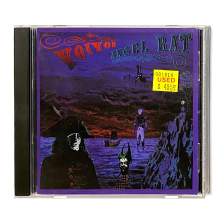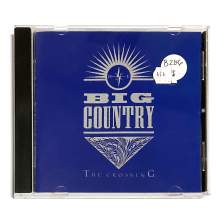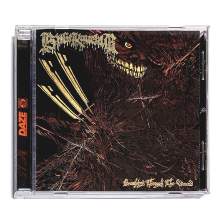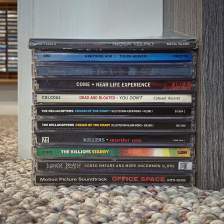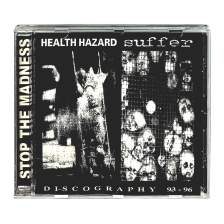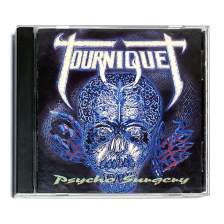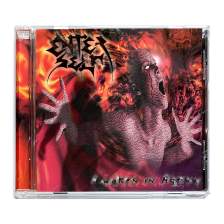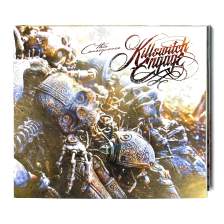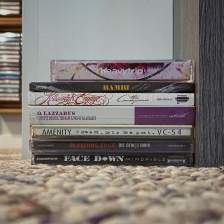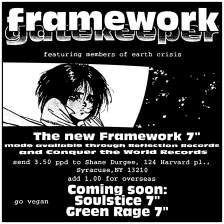
I've been a close follower of Oslo's This Sect since being exposed to their excellent Shake the Curse LP back in 2014. While that album presented an uncommon amalgam of alternative influences, its years-in-the-making follow-up, Everything We Know Into a Black Hole, finds the group fully-embracing the synth-cloaked gloom of their post-punk side. Like other bands I've written about in recent months, however, the Norwegians have gracefully handled the transition in a manner very much their own. Utilizing a writing and production process that builds atmospheres from the ground up with no concern for mirroring the lauded aesthetics of bygone eras, you'll discern recognizable components, sure, but the end result is This Sect through and through.
Out today via their own Sect Appeal Records—order now via Bandcamp, or stream through Spotify—Everything We Know Into a Black Hole is limited to 250 hand-numbered LPs on clear vinyl, elaborately packaged alongside an admirable 24-page 10" booklet that includes lyrics, artwork, liner notes, etc. Stream the entire affair below, followed by a discussion with frontman Gøran Karlsvik that contains a few surprising revelations regarding the tragically dark mindset that shaped the album...
It's hard to believe that it's already been four years since This Sect's last EP, and a stunning seven since your last full-length. I've been lucky enough to hear early snippets and rough mixes of material that would eventually find its way onto Everything We Know Into a Black Hole on and off for a couple of years now, so what I'm getting at is: it has been one hell of a long road to create this album! Talk about that journey a bit, as well as some of the causes or necessitations that may have fed into this duration of time.
A long journey, indeed! But not so long in "This Sect years" [laughs]. This is more of a "mood" oriented album compared to our previous output. Some of those details took time to figure out. We're all pretty nitpicky. Also, the workflow was completely turned on its head with the inception of this album. Usually, we jam out and write the songs as a unit—a very democratic one at that—which is awesome, but time-consuming. I can be a pretty restless soul, so I figured I'd write an album's worth of material by myself. I have a certain amount of drum machines, synthesizers, and grooveboxes that I've amassed throughout years of being in bands. Learning how to record and compose through those was a big driving force in the sound of this album. I composed about 15 songs on my gadgets and gizmos, and recorded them either at home or at our studio complex, Mir. 10 of the tracks made it onto the album.
At the time, I was severely depressed—a depression that eventually hospitalized me. I was sleepless and totally lost, and went into some sort of hyper-focus to finish recording my stuff. So, mental health—or lack thereof—was a huge driving part in the creation of Everything We Know Into a Black Hole, as the depression really warped my view of the world and my surroundings into a more dystopian and apocalyptic vision. I simply saw no hope—not for me, not for anyone.
When I'd recorded the skeletons of the songs—synths, beats, noise, and vocals—I handed them over to the band and our producer, Gunnar Kjellsby. Then they started adding layers of sinews and flesh to the skeletons—a very meticulous studio operation with lots of attention to detail [laughs]. I actually thought of the songs as "skeletons" at the time—sleepless and delirious, spiny, crooked little beings that needed meat and skin.
So, all in all, it was a complete shift in how to write and record an album. Very studio-focused, yet also very D.I.Y., and of course pretty confusing for everyone—me included, and I was out of my mind. Our producer really helped shape and structuralize the album. He also gets bonus points for being very patient and a rad dude. It took me a few months to compose and record my song skeletons starting in 2017, but it took years to record, produce, and flesh them out, so here we are in 2021. I can't give enough praise to my bandmates and our producer for the hard work and personal flair they've all put into this pretty crazy project given to them by a crazy dude. Big ups also to our mastering guy, Audun Strype. He really helped the mood and sound. Also, shout-out to THD Vinyl Mastering for handling the print process. Highly recommended, if you live in Norway and need vinyl done.
The second clear observation regarding Everything We Know Into a Black Hole is that the material marks a definite stylistic shift. Post-punk influences have long been part of your sound, but these compositions have plunged more fully into This Sect's manifestation of that niche, utilizing darker and more spacious atmospheres that present a different energy to the listener. I'm sure that much of this was simply natural, but to the degree that it's possible, discuss the ways in which you recognized—or intended for—this shift taking place.
It's difficult to sum up in a few words how that shift occurred. And forgive me if I'm being too blunt, I totally hate talking about my mental health in public. I don't want to seem like I'm "selling" this like some sort of "disaster porn." But, in this case, with this album, it seems unavoidable: it's probably pretty obvious that depression plays a part here, with the sound and tone of the record. Nobody in their right mind makes that sound. I've always used music and my other creative passions as outlets for my frustration. There's a constant need for catharsis. We can say that Shake the Curse was an extroverted album—very energetic and spastic—and a big part of the energy behind that album for me was dealing with the death of my brother. I exorcised those demons through that, I summed up the meltdown that killed him in a way.
Everything We Know Into a Black Hole, on the other hand, is a more introverted record, because I was going through my own personal meltdown at the time, and the album is a document of that period and my mindset. It was basically a suicide letter—my sendoff and final transmission before heading on into nothingness. I wanted it to be almost like a statement record: "Come, gaze into the void and see all the evils of mankind. If you want to feel what utter, total, depressive despair feels like, check out Everything We Know Into a Black Hole!" Not a good tagline, I guess [laughs]. But anyway, creativity is my greatest gift, and I'm glad I can channel those emotions into something productive. The introverted and hyper-focused mode I got into through composing and recording by myself was like a new beginning for me—one that I've continued to channel through my other projects such as Damokles, Contrarian, and Endtimers. By the way, those three projects are also releasing albums in 2021. I finally dared to kind of go out on a limb and create music from scratch, by myself, which to me still seems like pure magic.
That's heavy. I appreciate your openness about such a difficult topic. I sincerely hope you're feeling a bit better now. Did all of the effort that went into the creative process in fact act as that "catharsis" you spoke of, and help you to break through the suicidal fog?
It did. It helped me realize that creativity is maybe my most important "crutch." That's a part of why I've expanded so much these past few years.
In a few tracks such as "No Remedy" and "Cosmos Never Ends," one could almost argue that there's an undercurrent of synth-pop at play—granted, the morose nature of the album eases back on the actual "pop." At least in terms of the prominence of keyboards and the driving force of the bass lines, however, it's there... I think?
Synth-pop in its many forms has been a huge inspiration on This Sect since day one, I guess. We've always been pretty geeky about late-'70s to early/mid-'80s synth-pop—especially the U.K. flavor like Depeche Mode, Human League, John Foxx, Ultravox, Gary Numan, Heaven 17, etc. Synth was always a big part of any post-punk band we dig such as The Sound, The Chameleons, Joy Division and New Order, The Cure, and many more. The synth presence is a big part of the post-punk backbone, those two styles can sometimes be pretty interchangeable. But there are also newer synth trends in play here, like the quirky and glitchy ambience found in Boards of Canada, Venetian Snares, and Aphex Twin; the vaporwave boom; certain electronic soundtrack composers such as Clint Mansell and Trent Reznor; there's of course the obvious Devo worship that I have (I have two Devo tattoos, that's saying something); and "new" synthy bands such as Soft Moon, Drab Majesty, Soft Kill, These New Puritans, and Future of the Left; plus living in Norway and listening to A-ha, etc. Ole Andreas (guitar) and Are (synth) are also parts of a post-punk- and synth-pop-oriented DJ crew called Vaguely Obscure, and whenever they play out at clubs, I always discover some new gem or deep track. Those dudes are total connoisseurs.
The biggest shift in synth sounds on this album versus our earlier recorded output is that I started to use my synthesizer gear more. Two synth nerds are more than one. Our synth player Are has a very particular and melodic over-arching playing style. Almost like a lead guitar (keytar?), he carries the melodies and drives the songs forward in a structuralized pop-oriented fashion, while my contributions to the sound are more in the form of ambience, beats, noise, and layered textures. I like the outcome of that.
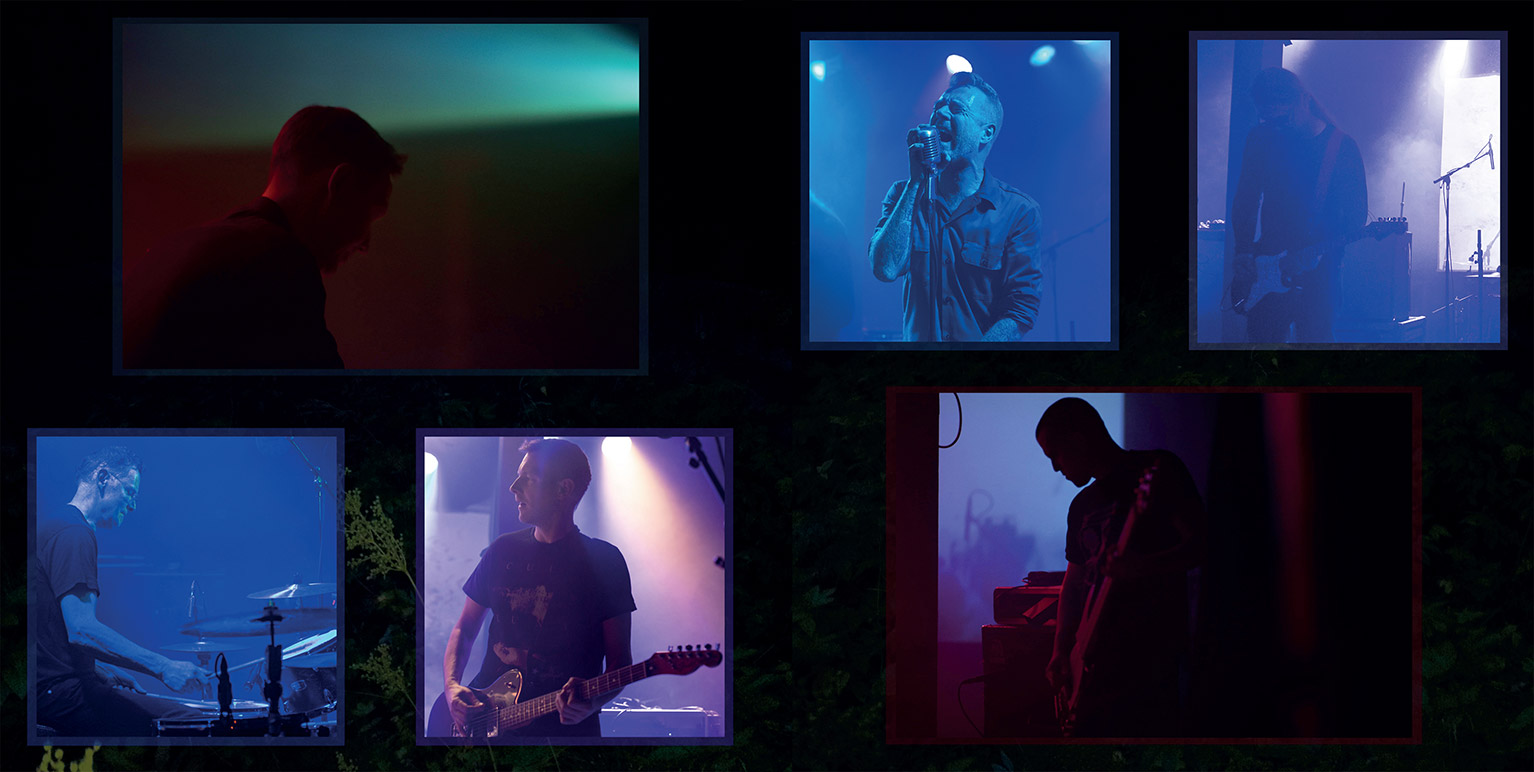
A characteristic I really appreciate that extends to—or was possibly drawn from—some of your other projects would be the sheer volume of imagery presented within the layout. Each panel of lyrics is granted its own unique artwork, threaded into the general aesthetic of the album/design. I appreciate this all the more due to how rare it's becoming. In this increasingly stream-centric age, I'm seeing more and more stripped down layouts that provide little-to-no reward for listeners who would prefer to hold something tangible in their hands.
Thanks! I love physical formats: vinyl, CDs, zines, books, comics... I'm also pretty into streaming music and using Bandcamp as a platform. I release a lot of music, and I can't afford to release all of my output on vinyl. Maybe I'll only post a project to Bandcamp and leave it at that, but even that tiny Bandcamp project needs some identity and content, and I want imagery to go with my music. I'll go out of my way to do graphic design and illustrate stuff, as well as direct music videos.
The first Contrarian album, Hit Singles 2018-19, was digital-only, but in the Bandcamp version you get a 30-page PDF booklet with tons of artwork, all the covers for the singles, etc. It's just a missed opportunity to not do it. And if I can ever afford to give that record a vinyl treatment, that 30-page PDF booklet will be printed as the inner sleeve.
I buy a lot of music on Bandcamp. Some of it is digital-only, and I simply love it when I get, for example, a PDF booklet or music video to go with the release. It gives me some content to go with the music, just like with a physical format.
This LP is also the latest release from your own Sect Appeal Records, and it seems the label is perhaps about to be quite busy with assorted other projects, is that right?
Very busy, indeed! We've had Sect Appeal Records as our own label since day one, but it was this year that we decided to treat it more like a proper record label. Us in the band and our circle of friends have so many bands and projects now, and the intention is to use Sect Appeal Records as a hub, a platform for all of those projects. Some of it will be digital-only or Bandcamp-only, while other releases will get the physical treatment. We're looking into fun ways of releasing physical media—like why not release an album like a book with lyrics, artwork, band info, comics, interviews, and download codes or a CD to go with it? A book can be cheap to print, and postage will be affordable. They look good on shelves. People still buy books.
The label is mainly "run" by me and Øystein (bass), alongside my creative partner Kenneth Olaf Hjellum, whom I'm doing the comedy show ZAP! with. Kenneth has projects, I have projects, Øystein has projects, and a lot of our friends have hard drives filled with projects. Our roster at the time being is This Sect, my other bands Damokles and Endtimers, Øystein's black metal band Ild, Kenneth's solo alias DJ Matinique, my electronic project Contrarian, the short-lived Post Love band will finally release their posthumous debut EP, me and Kenneth are doing a ZAP! comedy album on bubblegum vinyl, and much more to come.
This Sect has been able to remain fairly active during the pandemic, though obviously there is still some degree of a damper on certain activities, so I know it's too soon, but—for "fun"—if we view the Shake the Curse to Everything We Know... timespan/trajectory as a basis, where might you guess we could find This Sect circa 2028?
This Sect anno 2028 A.D.: I want to become part machine in order to communicate better with my drum machines, so I picture myself as a badass techno cyborg, maybe with some rad Wolverine adamantium claws, riding a hoverboard in a post-apocalyptic wasteland. Turns out, Everything We Know Into a Black Hole was an actual prophecy, and everything did go straight to hell.
But for real, I hope we exist as a band, and that we have continued to create and release music and maybe do some shows. I've known these guys for around 20 years, we're all good friends, and by being a band unit, we have a shared bond that's pretty special and dear to me.
***
Everything We Know Into a Black Hole is out now. Find tangible copies on Bandcamp, or stream through Spotify. Gather more from This Sect over at Instagram or Facebook. You can do the same for Sect Appeal (Instagram, Facebook).

